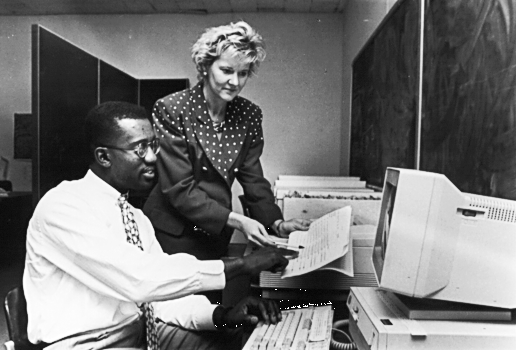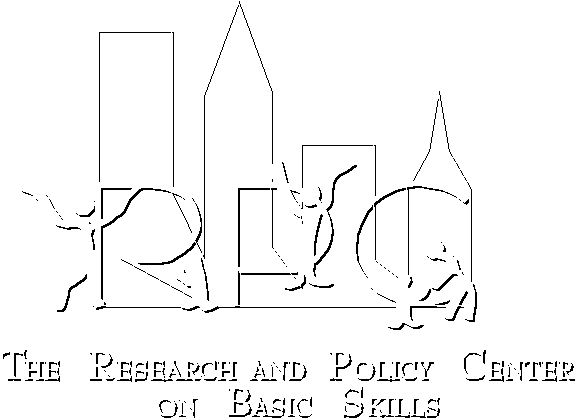|
- To provide an environment and facilities to conduct significant
studies; design public policy; and develop innovative,
research-based programs concerning families, communities and
children's learning.
- To disseminate research that has an impact on policies,
practices and programs that affect families, community support
systems and children's learning.
- To demonstrate research capability at a state, regional and
national level which denotes the center as accomplished among peer
institutions and in the broader research community.
|
Introduction
| The Center for Research and Policy on
Basic Skills (RPC) was established at Tennessee
State University (TSU) in 1984. TSU is a major urban and
comprehensive university.
This unique combination of characteristics enhances the
university's instructional, research
and public service mission to which the center makes important
contributions. |
Research Agenda
| Center research pays particular
attention to school, community and business practices
which promote the physical, educational and psychological
well-being of children and
families. Some examples of research topics are:
- Economic, school and welfare reform.
- Family strengths and coping capacities.
- Comprehensive family support programs and school-linked family
resource centers.
- Case management and family services.
- Early childhood intervention programs and preschool to school
transition.
- Longitudinal study on class/school size effects on academic
achievement/graduation .
- Systemic change initiatives in science, mathematics and
technology education.
- School-to-work transition.
|
Bureau of Evaluation and Research
Services
|
| The RPC's Bureau of Evaluation and
Research Services houses demonstration projects,
training programs and evaluation contracts conducted in
collaboration with schools and
other public agencies. The bureau also provides instructional
programs, research laboratories
and a nationally accredited early childhood education center for
infants and preschool
children.
Several externally funded research and demonstration projects are
currently being administered
by RPC. The Tennessee Comprehensive Area Resource Efforts Program,
one suchproject, is a national model for comprehensive family
support, welfare reform and early
intervention. |
|  |
CUTTING EDGE STATISTICAL ANALYSIS --
has demonstrated that school reform initiatives result in improved
academic achievement. Dr. Barbara Nye, center director, is shown
here with TSU graduate student, Mr. Richard Cosby.
|
Outreach Activities
|
| The center supports several project
and program advisory groups with statewide membership.
These currently include the Tennessee Multiage (Nongraded) Research
Network, the
Tennessee Hands-On Science and Technology Consortium, the Tennessee
Early Childhood
Training Alliance, the Tennessee CAREs Policy and Business
Councils, and the
State Resource Committee on Welfare Reform. The center also houses
the Families for
Learning Technical Assistance and Evaluation Institute which
conducts early and adult
literacy research.
Center personnel are active in publishing research; giving
presentations at international,
national and regional conferences; serving on state and national
policy committees; and
providing public service. RPC research scientists, faculty and
project staff also conduct
training and academic programs and are active in significant
aspects of demonstration
program implementation. They also provide technical assistance to
collaborating schools
and public agencies. |
Looking to the Future
|
| The center is preparing cutting edge
research to improve Tennessee's community and
economic development base. It will continue to collaborate on
national and international
studies to augment academic performance, increase learning
opportunities for all students
and improve the health of low-income populations. The center will
also continue to
involve the private sector in systemic change initiatives in
schools and public programs. |
Conclusion
|
| Since 1984, the center has been an
integral part of Tennessee State University's contributions
at a state and national level. Its solid reputation is based on
significant research,
collaboration and public service. The volume of externally awarded
projects and research
studies reflects the recognition and respect the center has gained
in the areas of research
and policy development within the state and nation.
Center research has been used to establish goals and obtain General
Assembly approval
of funds for the state's Basic Education Program to adequately fund
public schools; to
support establishment of school-based family resource centers in
Tennessee schools; to
reduce K-3 class sizes statewide; and to establish a nationally
recognized professional
development and resource distribution center for improving science
education, which
currently serves 110,000 Tennessee students and provides in-service
training for over 500
teachers annually. The center has also conducted research on health
care, reducing welfare
dependency and early intervention. Its comprehensive welfare reform
project has
already demonstrated that 70 percent of project participants
acquire and maintain career
path jobs and complete educational/job training programs. Also, the
project children have
entered school without requiring special education/remedial
programs. Together, these
efforts result in $3-$7 saved for each $1 spent. The center's
research and demonstration
of this project has been used to design the new federal Early Head
Start Initiative for
Infants and Toddlers.
|


|
|
|

